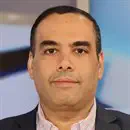
Dozens of senior rabbis from Israel, including the Chief Ashkenazic Rabbi of Israel, Rabbi David Lau, traveled to Spain this week to meet with Muslim and Christian leaders.
Over the course of the meeting, which lasted four days, the parties discussed ways to reach agreements and end the violence in the Middle East.
One of the organizers of the conference, former Minister Rabbi Michael Melchior of the now defunct Meimad left-leaning Religious Zionist party, said: "Something has happened in Israel. We made the first step. But it is more significant that the religious leadership is at the forefront of the peace effort."
"When we return to our land the test will be to implement the decisions [reached here] and to work together despite the differences." he said.
Among the participants was Sheikh Imad Al-Falouji, one of the founders of Hamas' violent Izz al-Din al-Qassam Brigade and former Minister in the Palestinian Authority. Al-Falouji, who in the past has said he is against terrorist targeting of Israelis civilians but believes targeting soldiers is justified, said : "We are meeting here in Spain because now, in these circumstances, our country is too narrow to hold us all. But we will expand on this meeting and meet again, later, in Jerusalem, Ramallah, and Gaza City."
Also participating in the conference were the Chief Rabbi of the city of Ramat Gan, Rabbi Yaakov Ariel, the Chief Rabbi of Kiryat Ono, Rabbi Ratzon Arusi, Rabbi of Ofra, Rabbi Avi Gisser, the Rosh Yeshiva of Yeshivat Mekor Chaim, Rabbi Dov Zinger, and the editor of the Encyclopedia Talmudit, Israel Prize Laureate Rabbi Dr. Avraham Steinberg, and many other Israeli rabbis.
The full statement of the rabbis:
"In the name of the Lord/in the name of Allah the merciful and compassionate.
"We, sons of the Holy Land and religious community leaders there, came here to take upon ourselves to strive with all our strength for peace in the whole country. We emphasize the responsibility of both nations to their destiny, and the responsibility of the three religions, and of the responsibility we as religious leaders have to promote a life of mutual respect of justice and security in the spirit of God's word in the hands of his prophets.
"We live in the Holy Land by the grace of God, and we ask to take upon ourselves his will. We recognize the sanctity of the land to all three faiths.
"The three religions respect the sanctity of life, and we call for that to be applied in everyday life. The violence done ostensibly in the name of God is a desecration of his name, an injustice toward his creatures, and mockery of faith. The means to resolve the conflict and the dispute is in negotiations and dialogue alone.
"We emphasize the importance of stopping the incitement, the misrepresentation and distortion of the image of the other, and take upon ourselves to educate future generations in mutual respect. Based on religious traditions and understanding the interests of our people and our communities, we call for a solution that recognizes the right of both peoples to live in dignity.
"We hope that 'From Zion shall go forth the Torah' and that peace between us will reach the entire world for the benefit of the peoples and the realization of their hopes.
"There is on the shoulders of religious leadership a special responsibility to contribute to achieving peace. We urge the political leaders of the Israelis and Palestinians to work toward a solution, but it does not replace our duty before God and before our communities of faith to promote peace, to pray and to strive for it tirelessly.
We declare the establishment of a Committee to implement the eternal principles in this document. We pledge to keep working together, and to work together with the clerics of other faiths, and to instruct the younger generation. We will work together to hear the sound of religious peace in the Holy Land for the benefit of all its inhabitants. And every part of society will do as he wishes with a full heart."
